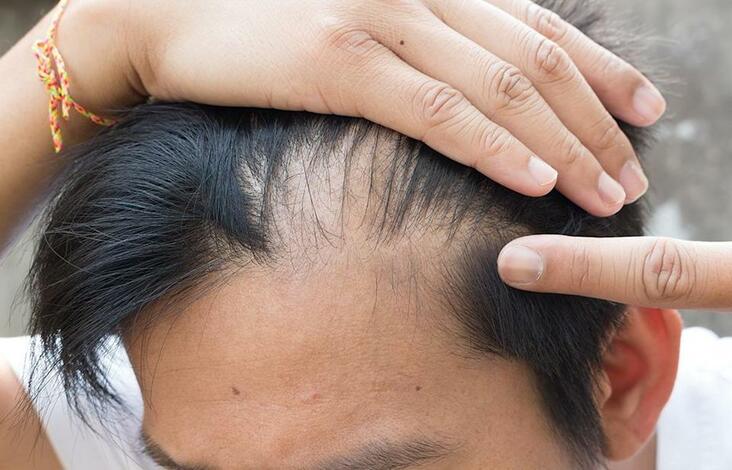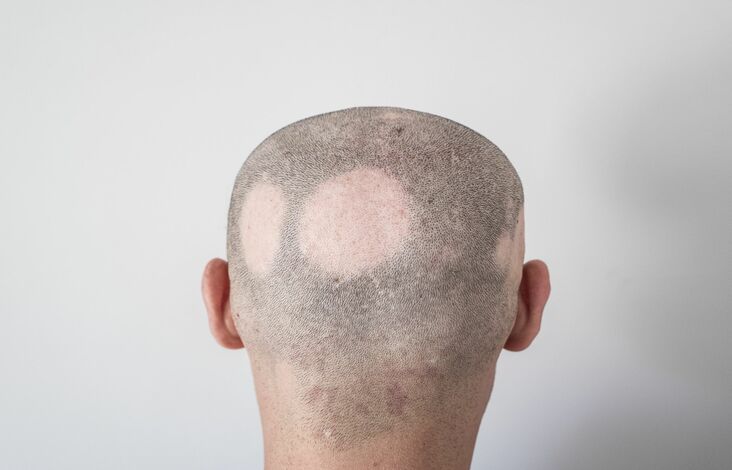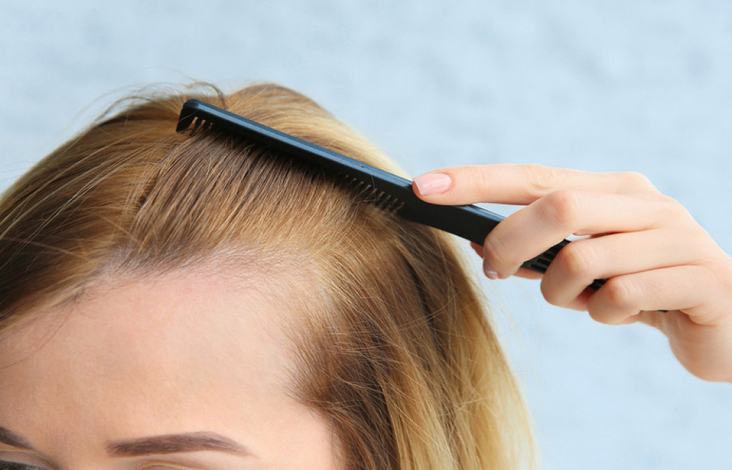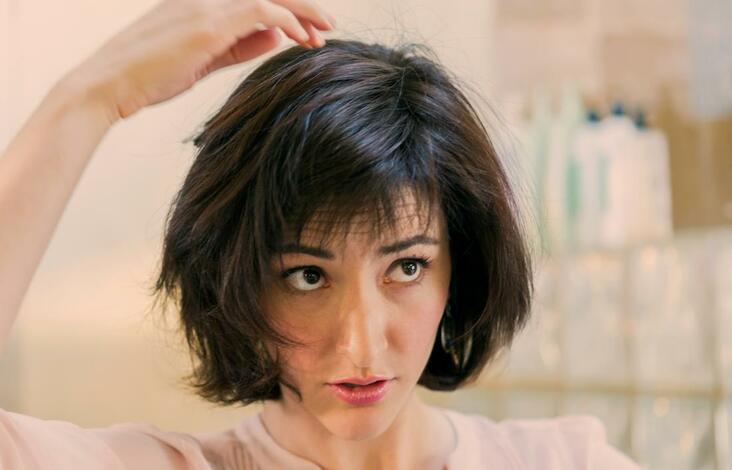6 Medical Conditions That Cause Hair Loss and Thinning
- Written by Victor Lordhair
- Sep 19, 2022
- |
- 16 min read
 Listen to the full text
Listen to the full textIt is normal to lose some strands since it’s part of the hair growth cycle. New hair replaces the ones that drop out after their life cycle is complete. However, there are some medical conditions that can interfere with the natural hair cycle of adults (even children) and cause hair loss.
A lot of people are unaware of medical conditions that result in noticeable thinning hair and even baldness. As a reason, they fail to address the health problem. If you are also one of them, keep reading!
In this blog, Lordhair will talk about 6 medical conditions that cause hair loss and thinning in both men and women. We will also discuss the treatments available and home care tips to deal with hair loss caused by each medical condition.
Medical Conditions That Cause Hair Loss: TLDR Version
Since some of you might be in a hurry to learn about hair loss causing medical conditions, here’s an FAQ version of this blog:
What are some of the different types of medical conditions that cause hair loss?
The following medical conditions are infamous for triggering hair loss in men and women:
- Thyroid disorders
- Scalp psoriasis
- Alopecia areata
- Lupus
- PCOS
- Seborrheic dermatitis
What are the treatments to overcome hair loss caused by thyroid disorders?
These treatments and lifestyle changes will help in stopping hair loss caused by thyroid disorders:
- Levothyroxine
- Propylthiouracil
- Healthy diet
What are some treatments to overcome hair loss caused by scalp psoriasis?
The following treatments and home remedies will help men and women in stopping hair loss caused by scalp psoriasis:
- Medicated shampoo
- Coconut oil
- Prescribed steroids
What are some treatments to overcome hair loss caused by alopecia areata?
These treatments will help in stopping hair fall caused by alopecia areata:
- Anthralin cream
- Minoxidil
What are some treatments to overcome hair loss caused by lupus?
The following lifestyle changes will help men and women in stopping hair loss caused by scalp psoriasis:
- Avoid sun exposure
- Get a hair system
What are some treatments to overcome hair loss caused by PCOS?
These lifestyle changes and treatments will help women overcome hair loss caused by this medical condition:
- Proper sleep
- PRP treatment
What are some treatments to overcome hair loss caused by seborrheic dermatitis?
The following treatments will help men and women deal with hair loss caused by seborrheic dermatitis:
- Antifungal creams, gels, and shampoos
- Calcineurin inhibitors cream and lotion
Now that we are done with the TL;DR version, let’s discuss different medical conditions that cause hair loss and thinning in detail.
Medical Conditions That Cause Hair Fall
#1 Thyroid disorders
The thyroid gland creates and produces hormones that help the body utilize energy, stay warm, and keep the brain, heart, muscles, and other organs of our body functioning perfectly. Thyroid hormones are secreted into our blood and carried away to every tissue. But when the thyroid gland makes either too much or too little of these hormones, thyroid disease occurs.
When a human body produces an inordinate amount of thyroid hormone, the medical condition is referred to as hyperthyroidism. On the other hand, if it doesn't generate as many thyroid hormones, it can lead to hypothyroidism. Both conditions can cause loss of hair in men and women.
Dermatologists state that thyroid disorders make human hair fall out from all areas of the scalp. Men and women suffering from this medical condition will notice a thin, low-density appearance of strands on their scalps.

Treatments for thyroid disorder hair loss
The following treatments can help in treating hair loss caused by this medical condition:
Levothyroxine: Levothyroxine is a prescription drug used to fix the underactive thyroid gland (hypothyroidism) that is producing little to no hormones. It brings thyroid hormone levels to normal and restores hair growth.
Propylthiouracil: Now unlike levothyroxine, propylthiouracil is a prescription-based antithyroid medicine. It doesn’t block the effects of thyroid hormone but instead makes it harder for the body to use iodine to produce more hormones. Thus, restarting the hair growth cycle.
Healthy Diet: Eating a diet full of whole foods like eggs, lamb, beef, chicken, fish, cruciferous vegetables, gluten-free grain and seeds, milk, cheese, and yogurt can also help in fixing hair loss caused by the thyroid medical condition (hypothyroidism).
The relationship between thyroid and hair loss explained
#2 Scalp psoriasis
Scalp psoriasis is a rare but long-lasting medical condition in which the immune system becomes overactive and causes skin cells to build up recklessly. Scientists say that new skin cells are produced in days rather than weeks. Since the human body is unable to shed these excess skin cells, they heap up on the surface of scalp skin, causing patches of psoriasis to appear.
The scaly, red, bumpy patches caused by this medical condition can result in silvery white scales, flakes, dry scalps, burning, and soreness. They make men and women scratch their heads and make their weak hair fall out. Although the hair loss caused by this medical condition is temporary, it can sometimes go through cycles, spreading for weeks or months.
Treatments for scalp psoriasis
These treatments can help men and women deal with hair fall caused by scalp psoriasis:
Medicated shampoo: Regular shampoo can make the scalp and hair overly dry during this medical condition. This can result in hair loss. Use a medicated shampoo rich in salicylic acid. It will lift and soften hair strands and help get rid of scales on the scalp.
Coconut oil: This natural remedy will not only help in treating hair loss caused by scalp psoriasis but also inflammation. It has a unique combination of fatty acids that improve strands' health and also condition them. The anti-inflammatory properties of coconut oil help ease psoriasis pain.
Steroids: Another treatment that can help in dealing with hair loss caused by this medical condition. Corticosteroid creams, injections, and short-term systemic steroids can help men and women with hair recovery. They can reduce swelling, inflammation, and redness of lesions caused by scalp psoriasis.
Note: We highly suggest taking a prescription from a dermatologist before using steroids for treating scalp psoriasis hair loss or any other medical condition.
#3 Alopecia areata
Our readers will be surprised to know that roughly 6.8 million people in the United States become affected by alopecia areata. For those who are wondering what kind of medical condition it is, it is an autoimmune disorder that often results in unforeseeable hair loss. Alopecia areata causes hair strands to come out often in clumps.
During hair loss, men and women will notice small coin-shaped bald patches on the scalp and other parts of the body. Although hair loss caused by this medical condition can be fixed in some cases, it usually leads to permanent hair damage.
The amount of hair fall caused by alopecia areata differs from individual to individual. While some lose hair strands in only a few spots, others lose a lot. This medical hair loss condition happens mostly before the age of 30.

Treatments for alopecia areata
The following treatments will help in fixing hair loss caused by this medical condition:
Anthralin cream: One of the best treatments to overcome alopecia areata in the primeval stage. This synthetic, tar-like ointment can be applied to hairless patches once a day and washed off after 30-50 minutes. Men and women who use anthralin cream usually notice results within 8 to 12 weeks.
Minoxidil: Medications like minoxidil can also help in dealing with hair loss caused by this medical condition at an early stage. Introduced first as an oral drug to treat high blood pressure, it is a vasodilator that enlarges blood vessels to slow down hair loss and promote hair regrowth.
However, as we mentioned above, we highly advise getting a prescription from a dermatologist since minoxidil can have its share of side effects.
Most common side effects of minoxidil in men
#4 Lupus
Another medical condition that causes hair loss in men and women. Lupus is an autoimmune disease in which our immune system attacks its own tissues and organs. Also called systemic lupus erythematosus, this condition can trigger body-wide inflammation of the skin, especially on the face and scalp region.
Lupus on the scalp can cause rashes and damage hair tissues. Hair strands become fragile and break off easily, leaving men and women with a ragged appearance. Dermatologists also state that this medical condition can also cause hair to fall from eyebrows, eyelashes, beards, and other parts of the human body.
Men and women facing lupus hair loss will also notice low-grade fever, pain, and swelling in joints.
Treatments for lupus hair loss
Truth be told, one may not be able to completely reverse the hair loss or thinning caused by this medical condition but can minimize the damage by considering the following tips:
Avoid sun exposure: Avoid going outside when the sun is at its brightest. Exposing the scalp to the sun triggers photosensitivity among lupus patients and provokes rashes on the scalp. Have to go outside urgently? No problem. Protect the head by wearing a hat or cap.
Get a hair system: As we said earlier, lupus hair loss isn’t completely preventable or reversible. The best solution to get your hair back may be to try hairpieces for men or hair toppers for women. Also called a modern-day wig, hairpieces provide coverage for the scalp area that is experiencing baldness.
Check out how amazing Juha looks after trying a Lordhair hair replacement system:
#5 PCOS
Polycystic ovary syndrome (PCOS) is a hormonal condition that takes place during the reproductive years in women. When this medical condition manifests itself, reproductive hormones go out of balance. Women with PCOS disorder either have infrequent or prolonged periods due to excess androgen levels in the body. And that’s not the only problem they face!
In some cases, the hormonal imbalance caused by this medical condition also triggers hair loss and thinning. If not taken care of in time, the hair damage may even get worse. Other than hair loss on the scalp, girls may face sudden weight gain, diabetes, acne, and abnormal facial or body hair.

Treatments for PCOS hair loss
The following treatments and lifestyle changes can help women deal with hair loss caused by this medical condition:
Proper sleep: Scientists state that PCOS adversely abrupts the sleep cycle of women. Our body creates a hormone called melatonin which is connected with hair growth. When women suffering from PCOS don’t sleep properly, their melatonin hormone levels drop further. This results in hair loss.
Try to get at least 7-8 hours of sleep every night to overcome hair loss caused by this medical condition.
PRP treatment: Proper sleep isn’t going to do wonders for every woman suffering from PCOS hair loss. We also suggest going with PRP treatment. Also called platelet-rich plasma, it involves the extraction of concentrated platelets and shooting them into damaged areas of the scalp to restore hair growth levels.
#6 Seborrheic dermatitis
Our list would be considered incomplete without talking about this medical condition. Seborrheic dermatitis is a skin disease that forms red, flaky patches and makes scalp skin greasy. It is the result of the overproduction of thick sebum by sebaceous glands. Although the medical condition itself doesn’t cause hair loss, excessive scratching of the scalp definitely does.
Scratching of the scalp during seborrheic dermatitis can do serious damage to hair follicles, resulting in hair loss in men and women. Scientists also believe that extra sebum on the scalp also results in the overgrowth of a yeast called Malassezia. It can cause inflammation which may make it difficult for the strands to grow on certain areas of the scalp.
Treatments for seborrheic dermatitis
Here are a couple of types of treatments that can help you deal with hair loss caused by this medical condition:
Antifungal creams, gels, and shampoos: Seborrheic dermatitis hair loss can be fixed by prescribed antifungal creams, gels, and shampoos prescribed by the doctor. They contain ketoconazole and ciclopirox which can help you slow down inflammation and restore the growth of hair in the infected areas.
Calcineurin inhibitors cream and lotion: Using creams and lotions like pimecrolimus (Elidel) and tacrolimus (Protopic) can also fix hair loss caused by this medical condition. They are rich in calcineurin inhibitors which makes them more effective. Also, unlike corticosteroids, they have fewer side effects.

Diseases That Cause Hair Thinning: Final Words
Above are some medical conditions that cause hair loss and thinning in both men and women. These conditions can cause minor to major hair loss and may also result in inflammation or aggressive scratching. However, hair may start to grow back once the medical condition is addressed through OTC or prescription treatment and lifestyle changes.
Lordhair highly recommends using toupee hair replacement systems for men (and women), especially if the hair loss is extreme and you see no signs of hair recovery. We design and supply the world’s best range of stock and custom hair replacement systems to more than 100 countries. Our products also come with a 30-day money-back warranty.
Got any queries for us? Send them to support@lordhair.com and have them answered by our hair experts.
Also read:
- The relationship between hard water and hair loss
- A quick guide to stopping PCOS hair loss and thinning
- Everything about vitamin B12 hair loss
- Everything about iRestore laser hair growth
We also recently launched new product pages focused on hair loss conditions. Check them out:
- Perfect wigs for alopecia recovery
- Discover partial hairpieces for receding hairlines
- Wigs for cancer at the best discounts
- Waterproof wigs for those who love to swim!


